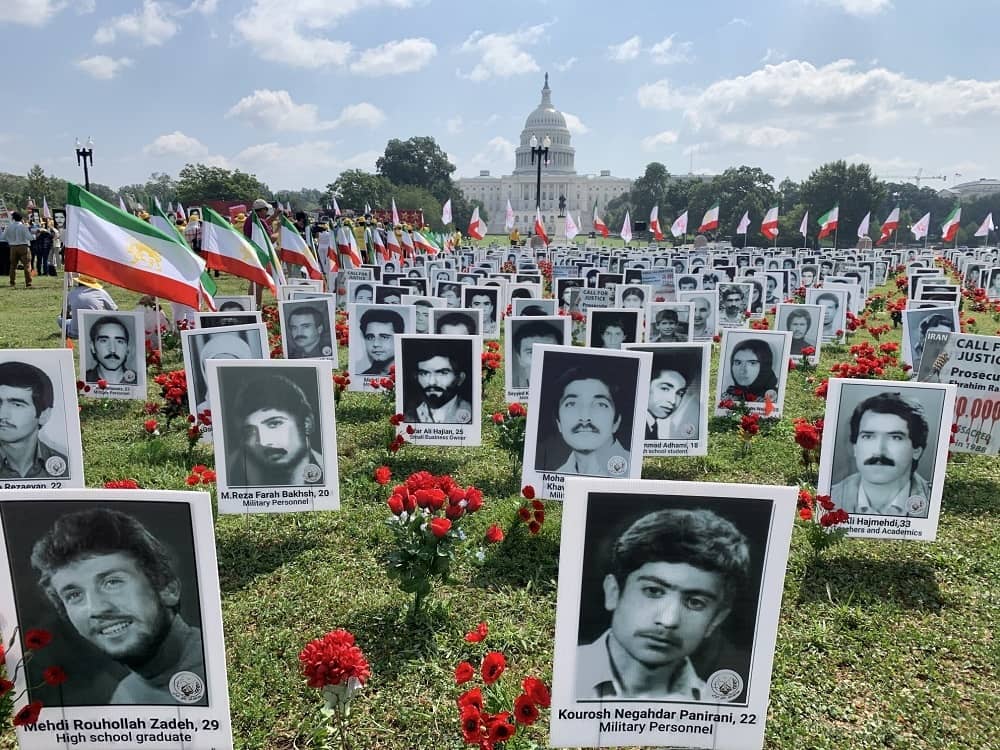
In 1988, the founder of the mullahs’ regime, Ruhollah Khomeini, orchestrated a brutal massacre of political prisoners associated with the People’s Mojahedin Organization of Iran (PMOI/MEK). His intention was to eliminate his main opposition and any potential alternative once and for all. Little did he anticipate that this heinous crime against humanity would ignite a justice-seeking movement that would endure for decades and extend across the globe.
Under Khomeini’s fatwa, anyone expressing support for the MEK was to be annihilated, and the names of these freedom fighters were to be erased from history everywhere.
During July and August 1988, thousands of political prisoners were executed daily in Iranian prisons, known as the 1988 massacre. This atrocity led to the death of over 30,000 political prisoners, primarily comprising MEK members and supporters.
The regime went to great lengths to conceal this barbaric act, burying the bodies in unmarked mass graves, withholding information about the prisoners’ fate from their families, intimidating parents to prevent funerals, and later destroying any evidence of the mass killings.
On July 18, 2023, the 35th anniversary of the massacre, a parliamentary conference was held in the British Parliament. The gathering included the UN Special Rapporteur on Iran affairs, Javaid Rehman, along with representatives from both the House of Commons and the House of Lords, across all political parties.
During the conference, Professor Rehman strongly condemned the lack of accountability for the regime’s leaders and officials regarding the crimes committed in Iran. He called for an international investigation into the 1988 massacre of thousands of political prisoners, denouncing the regime’s efforts to cover up the killings and suppress information from victims’ families.
Lord David Alton, who moderated the conference, urged the UK government to support referring the regime’s human rights case to the UN Security Council for punitive measures.
MP Bob Blackman highlighted the urgent need for accountability, pointing out that one of the perpetrators of the 1988 massacre, Ebrahim Raisi, had become the President of Iran. He emphasized that the Iranian Judiciary is implicated in domestic repression and cannot be trusted to deliver justice for the victims.
This parliamentary conference in England is part of the ongoing movement for accountability pursued by the Iranian Resistance. Despite Khomeini’s belief that his crimes would fade into oblivion, the legacy of the victims continues to inspire rebellion against the oppressive regime.
Dr. Tahar Boumedra, director of Justice for the Victims of the 1988 Massacre in Iran (JVMI), highlighted Khomeini’s criminal intent for the massacre and noted that his fatwa remains in effect. According to the UN Working Group on Enforced or Involuntary Disappearances (WGEID), the 1988 massacre qualifies as an “enforced disappearance” and is, therefore, an ongoing crime.
Mrs. Maryam Rajavi, the president-elect of the National Council of Resistance of Iran (NCRI), expressed that the victims’ sacrifices have left an indelible mark on the Iranian people’s struggle for justice and freedom. The Call for Justice Movement embodies the resilient spirit of standing one’s ground against oppression and is pivotal to the revolution’s advancement.
In conclusion, the 1988 massacre of political prisoners is a dark chapter in history that has spurred a global quest for justice and accountability, shaking the very foundations of the mullahs’ regime. The courage and resilience of the victims and their supporters have united in their pursuit of a democratic Iran, despite the regime’s attempts to silence them.